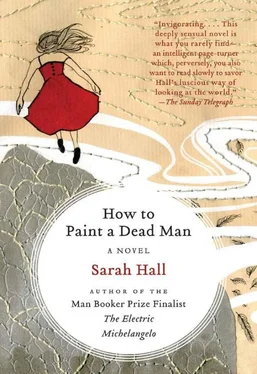Sarah Hall - How to Paint a Dead Man
Здесь есть возможность читать онлайн «Sarah Hall - How to Paint a Dead Man» весь текст электронной книги совершенно бесплатно (целиком полную версию без сокращений). В некоторых случаях можно слушать аудио, скачать через торрент в формате fb2 и присутствует краткое содержание. Год выпуска: 2009, Издательство: Harper Perennial, Жанр: Современная проза, на английском языке. Описание произведения, (предисловие) а так же отзывы посетителей доступны на портале библиотеки ЛибКат.
- Название:How to Paint a Dead Man
- Автор:
- Издательство:Harper Perennial
- Жанр:
- Год:2009
- ISBN:нет данных
- Рейтинг книги:4 / 5. Голосов: 1
-
Избранное:Добавить в избранное
- Отзывы:
-
Ваша оценка:
- 80
- 1
- 2
- 3
- 4
- 5
How to Paint a Dead Man: краткое содержание, описание и аннотация
Предлагаем к чтению аннотацию, описание, краткое содержание или предисловие (зависит от того, что написал сам автор книги «How to Paint a Dead Man»). Если вы не нашли необходимую информацию о книге — напишите в комментариях, мы постараемся отыскать её.
, Sarah Hall, "one of the most significant and exciting of Britain's young novelists" (
), delivers "a maddeningly enticing read... an amazing feat of literary engineering" (
).
How to Paint a Dead Man — читать онлайн бесплатно полную книгу (весь текст) целиком
Ниже представлен текст книги, разбитый по страницам. Система сохранения места последней прочитанной страницы, позволяет с удобством читать онлайн бесплатно книгу «How to Paint a Dead Man», без необходимости каждый раз заново искать на чём Вы остановились. Поставьте закладку, и сможете в любой момент перейти на страницу, на которой закончили чтение.
Интервал:
Закладка:
Sarah Hall
How to Paint a Dead Man
For Jake
‘Things are not what they are, they are what they become.’
GASTON BACHELARDThe Mirror Crisis
You aren’t feeling like yourself. You haven’t been feeling like yourself for a while now, not since the accident. More accurately, not since the moment you heard about it. That morning, that minute, holding the phone to your ear and hearing your father say those horrific words; it was then you felt the change, then when you were knocked out of kilter. You’re not sure what’s wrong exactly; it’s hard to put your finger on, hard to articulate. It isn’t grief. Grief would be simple. Something internal, something integral, has shifted. You feel lost from yourself. No. Absent. You feel absent. It’s like looking into a mirror and seeing no familiar reflection, no one you recognise hosted within the glass.
You’re not crazy. You must emphasise this point and remind yourself of it. You are not crazy. And you’re not being coy, or difficult. This isn’t about fashionable social detachment, the current trend for woe-is-me, or wanting to be the cool detached outsider. You can’t quite catch sight of yourself as you go about your life, that’s all. Your body doesn’t contain its spirit, just as the mirror has relinquished your portrait. You are elsewhere.
You used to feel something similar as a child, but it was less empty, less lonely then. Your brother was the same. The pair of you had a peculiar sense of each other, not as separate people but as doppelgängers, symmetries, which is quite common in twins of course. You weren’t formed from a separated egg-you weren’t identical, not a common gender, John and Jack, or Ruth and Rita. Still, there you were, together, from the very beginning. You linked fingers in the womb. You shared a pillow of placenta, pedalled in tandem against your mother’s belly. You heard concurrently the wet chamber music of her body, shared nutrients, and dreamt the same hermetic dream. After you were born, pink then blue, you then Danny, your existences were still pegged closely together, like your newborn hats on the washing line.
Later, it was as if you were sitting with him on the sofa, at his exact coordinates, when really you were sitting opposite him at the table, making potato prints with your mum. Sometimes you felt you were more at his location than you were at yours. Ulterior proximity, it’s called. When you waved it wasn’t to your brother, it was to yourself. Nobody ever worked that out, not even your mum, who said, Wave to Danny again, sweetheart, he’s waving back. You were placed in separate cribs, but the heat of him still kept you warm at night. He still tugged the blanket away from your cheek when he tucked it up under his own. At least, that’s how it felt.
Inevitably, you learned to talk. This is when things got tricky. You developed a method of speaking on behalf of the displaced you. It was logical, in a way. At first they thought you were speaking on behalf of your brother, as bossy, older siblings often do. You want juice please, you said, and they gave it to Danny in his chewed sippy-mug. And would you like some juice too, Suzie-Sue, they crooned. Such an adorable bond, people said. So unusual. There were lots of baby photographs taken with you looking quizzical, frowning at items around the room or at the adults posing with you. Your brother was quiet, quieter than you, and always smiling, as if he knew a secret.
The situation became worrying. Playgroup was a minefield. Nobody could really tell who you were talking about: yourself or Danny. The subjects of your speech were often confused, and you and your brother babbled privately together, making up names for spiders, stomach aches, and rain. You did not make friends with the other children at first; instead the two of you played hoops and balls together and swapped beakers of milk; there was a system of cup colours to be observed. There was talk of educational retardation, developmental limitation, which shocked your mum and dad. There were visits from the healthcare worker, District Nurse Lane. You remember her rigid triangle skirt and her bleached cuticles. She wondered about this inseparability, this double-speak. She wondered if, rather than being delightful, it was abnormal to possess a psychological satellite. She wondered how healthy the relationship really was between Danny and you.
Enter Dr Dixon, at the paediatric clinic in town. Because you seemed to be the one in charge, because the sibling unity was too powerful, you were going to have special lessons with him, to help you ‘be more comfortable’. The building had a brass bell, and an old wooden revolving door wheelchairs couldn’t fit through: the first time you went you watched a girl with callipered legs being lifted up and carried through. It looked as if she were being fed into a giant grinder, and when it was your turn you had to be cajoled and encouraged into the blades. The carpet inside was made of tiny blue plastic threads. After you’d walked across it there was enough static to make a little jolt of electricity crack from your fingertip when you touched the table. There were anti-smoking posters with cloud-skulls floating above people holding cigarettes. Dr Dixon kept a tank of stick insects in his reception for the kids to look at. Sometimes they shed, leaving their skins behind on the aquarium trees where they dried and curled like thin spun toffee. It made you feel queasy to see the brown husks hanging off the forks of bark.
The doctor smelled of pencil shavings and peppermints. He spoke very slowly, very deliberately. His teeth looked white and strong. For a while you thought he was a dentist, but he never asked you to open wide. Instead he held you gently by the shoulders and asked impossible questions. What do you think is the best way to answer this question, Sue? If I took away your mother and father, and then I took away your brother Danny, what would you be called? The last proposition always made you furious, and you scowled yourself into a headache. He asked you to paint pictures of your family. Who do you see here, here and here? You were encouraged to play by yourself each day, without Dan, without dolls, or books. It seemed particularly unkind to your brother, who looked crestfallen whenever your mum said it was time for you to go upstairs for ‘special hour’. Only once did Danny come to the clinic. The two of you were put in an observation room and left alone. You endured six months of Dr Dixon. It felt like years. Then the whole thing was over. Only later, when you were a teenager and you asked about those memories, was it described, apologetically, as treatment. Now you can’t pass by the old sandstone clinic at the top end of your hometown without hearing that man’s relentless nasal parroting. Say I do, Sue, say I do, Sue.
But it worked, you suppose. You learned to communicate normally, like the rest of the psychically circumscribed automatons of the world. You looked at yourself in the mirror Dr Dixon gave you to hold. You repeated the words until they stuck. Me, me, me. I, I, I. You wound back into yourself, like the reversing spool on your mum’s sewing machine. You became a separate unit. You were cured.
Now here you are again, dislocated, remote, spilling your essence out into the void.
You’ve been thinking about this. You’ve been wondering if you are really so different from everyone else in the massive, grinding city where you live. You look at the variety of faces opposite you on the bus; listen to the conversations. Everyone seems to be in crisis. You just want to get out of the financial mess, a man in a grey suit says to his black-suited colleague. An oily teenager yells into his mobile phone: You can’t help feeling like a bastard for wanting her to get rid of the thing. She was the one who forgot to take the fucking pill! An Asian woman with a nose piercing softly confides in her friend: You get sick to death of his moods. You want to kill him. You really do.
Читать дальшеИнтервал:
Закладка:
Похожие книги на «How to Paint a Dead Man»
Представляем Вашему вниманию похожие книги на «How to Paint a Dead Man» списком для выбора. Мы отобрали схожую по названию и смыслу литературу в надежде предоставить читателям больше вариантов отыскать новые, интересные, ещё непрочитанные произведения.
Обсуждение, отзывы о книге «How to Paint a Dead Man» и просто собственные мнения читателей. Оставьте ваши комментарии, напишите, что Вы думаете о произведении, его смысле или главных героях. Укажите что конкретно понравилось, а что нет, и почему Вы так считаете.












